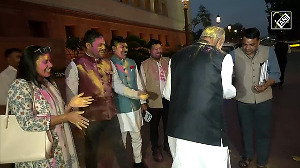 The Supreme Court on Friday directed judicial officers to release all such prisoners who have spent half of the maximum sentence for the offences they are charged with.
The Supreme Court on Friday directed judicial officers to release all such prisoners who have spent half of the maximum sentence for the offences they are charged with.
Though Indian law provides for the release of prisoners if they have completed half the sentence for their offence, the rule has been overlooked more often than not.
The observations came while the court was hearing a PIL on Kashmiri undertrials languishing in jails.
The Apex court said all lower judicial officers should visit jails within their jurisdiction once in a week for two months to find out the condition of undertrials.
According to the court, judicial officers must start visiting jails from October 1 and file a report after two months on prisoners released by them.
The SC further directed the Centre to place before it a road map for fast tracking the criminal justice delivery system.
While expressing concern over lack of budgetary support to the judiciary, the court asked the Centre to grant more funds to create infrastructure.
Earlier on August 29, the court had termed the issue of undertrials languishing in jails as 'serious' and had asked the Centre to convene a meeting of home secretaries of all the states to find a solution to the problem.
"This is a very serious matter. There are over 31,000 Scheduled Tribe (ST) and Scheduled Caste (SC) undertrial prisoners. This is the obligation of states and every state has to take care of undertrial prisoners," a bench comprising Chief Justice RM Lodha and justices Kurian Joseph and RF Nariman had said.
The bench asked the Centre not to remain a "mute spectator" and rather act as a nodal agency.
"You (Centre) act as a nodal agency. Talk to the states. You cannot remain as a mute spectator," it had said.
The bench, which had made all state government as parties, was hearing the PIL filed by Jinendra Jain on behalf of society 'Fight For Human Rights' alleging that thousands of tribals were languishing in various central jails without any trial in Naxal-affected states like Chhattisgarh, Madhya Pradesh, Jharkhand and West Bengal.











 © 2025
© 2025